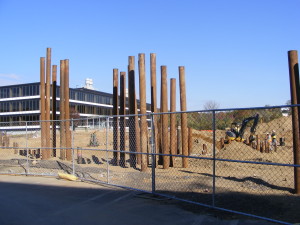It was a groundbreaking ceremony for a company”™s approximately $100 million expansion in Westchester County that recently drew the usual assemblage of dignitaries and phalanx of cameras to the Landmark at Eastview life sciences campus. Yet the event, hosted by Regeneron Pharmaceuticals Inc., was as much a company”™s rousing inward-directed celebration of its own employees, corporate culture and astonishing financial and commercial success in the last two years after a quarter-century in business.
For the founding CEO of Regeneron, the state”™s largest biotechnology employer and Science magazine”™s top-ranked biopharmaceutical employer in the world for two consecutive years, the Oct. 28 groundbreaking served too as a timely bully pulpit from which to advocate for strong regulatory oversight of private industries by well-funded federal agencies.
“Regeneron can be summed up: you”™re an impressive job-creating machine,” said U.S. Sen. Charles Schumer, addressing a large, enthusiastic audience of Regeneron employees and guests under a tent on the Mount Pleasant side of Biomed Realty Trust”™s town border-straddling Landmark campus. Now one of the top five biotech companies in the world by market capitalization, Regeneron has more than tripled its employment numbers since 2007, when it had 682 workers in Westchester.

As New York”™s senior senator spoke, construction crews nearby readied a cleared site for two buildings that will add 300,000 square feet of laboratory and office space to Regeneron”™s Westchester headquarters, where more than 1,500 workers are employed. The company employs nearly 700 workers at its industrial and product supply operations facility in upstate Rensselaer, where Regeneron last year embarked on a $70 million expansion that will create about 300 jobs.
The Landmark project will increase by more than 40 percent the company”™s existing square footage on the Greenburgh side of the research campus and create about 400 full-time jobs. The buildings are projected to be occupied by the third quarter of 2015. The two-year development is creating about 1,000 construction jobs.
To keep the company”™s expansion in New York, the state has approved $8.5 million in Excelsior Jobs Program tax credits for the jobs-creating project. The Town of Mount Pleasant Industrial Development Agency will provide an undisclosed amount of additional financial incentives. While state officials did not disclose other locations eyed by Regeneron, the company operates a third facility in Basking Ridge, N.J.
Kenneth Adams, president, CEO and commissioner of Empire State Development, at the ceremony noted the state”™s long-term relationship with Regeneron. When Dr. Leonard S. Schleifer founded the company in 1988, New York made an equity investment of $250,000 in the promising biopharmaceutical business.
Regeneron repaid that sum to the state before it became NASDAQ”™s top-performing stock in 2012 and, as U.S Rep. Nita Lowey said at the ceremony, created more than 500 millionaires among its shareholding employees.
“Had that (New York”™s $250,000 investment) been converted into warrants for common stock, where would we be?” Adams mused, drawing laughter from the crowd.
All those newly minted millionaires at Regeneron? “According to the real estate agents in Westchester County, they are grateful,” Lowey said.
Westchester County Executive Robert P. Astorino told Regeneron executives, “If this growth continues, I think you might need your own zip code here.”
Citing the company”™s high-performing stock last year, driven by sales of Eylea, its newly marketed drug for treatment of age-related macular degeneration, Astorino said, “That was a $5 buy in 2005. It”™s around $300 now.”
To a standing ovation, Schleifer and his founding scientific partner at Regeneron, Dr. George D. Yancopoulos, warmly embraced onstage. Yancopoulos, a member of the National Academy of Sciences, is the company”™s chief scientific officer and president of Regeneron Laboratories, where he was a principal inventor and developer of the company”™s technologies and its three drugs to date approved for marketing in the U.S.
“This is not a story about two guys from Queens,” Yancopoulos said. “It”™s a story about 2,500 employees who have built I think the greatest company in the world”¦We have a unique opportunity to build a company for the ages.”
Yancopoulos noted the company”™s remarkable recent success “in an industry where failure is the rule and success is the exception.”
“Even when the outside world thought we were struggling, I knew we were the best company in the world,” he said.
“Very few biotech companies have ever been built from the ground up using their own science and technologies and inventions to the point where we are today”¦Today we”™re celebrating the future that we will be creating in our existing buildings and these two new buildings,” he said.
Schleifer in his closing remarks indicated that less government oversight and funding of biomedical research, underfunded federal agencies and laissez faire capital markets do not benefit companies like Regeneron.
Noting the cost for drug discovery and development to bring one product to market has been estimated at $1 billion, Schleifer said the industry needs strong capital markets in which to raise risk capital. A new regulatory system is needed to avoid more financial crises, when risk capital “dries up,” he said.
Schleifer said science-based companies like Regeneron need strong patent protections and a strong Food and Drug Administration “that sets appropriate standards of efficacy, safety and quality.”
A strong FDA guarantees “a strong biotech industry,” he said. Underfunding the FDA “is a terrible idea.”
“We at Regeneron get it,” Schleifer said. “We know if we are good at what we do, we can improve the lives of patients around the world.”

















